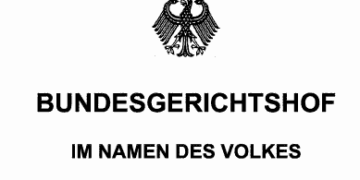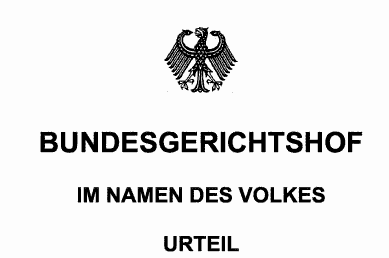On the right of withdrawal of a consumer residing in Germany when concluding “purchase and service contracts” for teak trees in Costa Rica with a company based in Switzerland via means of distance communication without withdrawal instructions
The VIII. Civil Senate of the Federal Supreme Court ruled today that a consumer resident in Germany is entitled to a right of withdrawal with regard to “purchase and service contracts” for teak trees in Costa Rica concluded by means of distance communication with a company based in Switzerland without a withdrawal policy and that this is not limited in time.
Facts:
The defendant, a company based in Switzerland, offered interested parties the purchase of teak trees on plantations in Costa Rica via its Internet homepage in order to achieve a return on the sale of the wood from these trees years later (“Teak investment – The natural powerhouse for your portfolio”). In addition, the defendant offered its customers the management, administration, felling, thinning, harvesting and sale of the acquired trees during the term of the contract.
In 2010 and 2013, the plaintiff, who lives in Germany, concluded a “purchase and service contract” with the defendant via distance communication for 800 and 600 teak trees for €37,200 and €44,000 respectively with a term of 17 and 14 years. The General Terms and Conditions of the defendant state that the contract is subject to Swiss law and that disputes are subject only to the ordinary jurisdiction of the courts at the defendant’s registered office in Switzerland; furthermore, the application of the Vienna Sales Convention (CISG) is expressly excluded. The plaintiff was not informed of any rights of withdrawal.
The plaintiff revoked his declarations of intent to conclude the two contracts at the latest with the statement of claim of August 2020.
Previous process history:
The action aimed in particular at the repayment of the fees less the timber proceeds already received (€ 1,604.86 and € 2,467.07 respectively), i.e. a total of € 35,595.14 and € 41,532.93 respectively, concurrently against the assignment of all of the plaintiff’s rights under the contracts, was largely successful in the lower courts. With the appeal allowed by the Court of Appeal, the defendant pursued its claim for dismissal.
Decision of the Federal Court of Justice:
The defendant’s appeal was unsuccessful. The Federal Court of Justice has ruled that the plaintiff is entitled to reimbursement of the fees paid by him, less the proceeds already received, step by step in return for the retransfer of the rights from the purchase and service contracts, in accordance with Section 312b para. 1 sentence 1, § 312d para. 1 sentence 1, § 355 para. 1, § 357 para. 1 sentence 1 BGB in the version valid until June 12, 2014 (old version) in conjunction with Section 346 para. 1, § 348 sentence 1 BGB.
The international jurisdiction of the German courts for the present legal dispute follows from Art. 15 para. 1 lit. c, Art. 16 para. 1 Alt. 2 of the Convention on Jurisdiction and the Recognition and Enforcement of Judgments in Civil and Commercial Matters, concluded in Lugano on October 30, 2007 (hereinafter: Lugano Convention II). In the present case, the plaintiff acted as a consumer in relation to the contracts and the defendant focused its commercial activity on Germany on the basis of the findings of the Court of Appeal. The provision contained in the defendant’s general terms and conditions on the exclusive jurisdiction of the courts at the defendant’s registered office in Switzerland is invalid under Art. 17 Lugano Convention II.
The contracts at issue are subject to Art. 6 para. 1(b) Rome I Regulation is subject to substantive German law; Art. 6 para. 4 letters a and c of the Rome I Regulation are not relevant. The applicability of substantive German law is precluded by the provision agreed by the parties in clause 27 of the GTC in accordance with Art. 6 para. 2 sentence 1 Rome I Regulation does not preclude the choice of Swiss law. It is irrelevant whether this choice of law clause is effective at all, as the applicability of German law to all legal issues relevant in the present case already follows from the legal principle set out in Art. 6 para. 2 sentence 2 Rome I Regulation.
The plaintiff was entitled under § 312b para. 1 sentence 1, § 312d para. 1 sentence 1, § 355 para. 1 BGB aF is entitled to a right of revocation that cannot be exercised in accordance with § 312d para. 4 No. 6 BGB aF is excluded. The decisive factor for the application of this exception is that the speculative nature is the core of the transaction. However, this is a long-term investment that is only indirectly speculative in nature. Insofar as § 312d para. 4 No. 6 BGB aF is based on price fluctuations within the withdrawal period, the length of the withdrawal period is based on the withdrawal period of 14 days provided by law for the standard case of proper withdrawal instructions.
The plaintiff also exercised the right of withdrawal effectively; in particular, the withdrawal period had not yet expired at the time of withdrawal due to the lack of proper instruction of the plaintiff about his right of withdrawal.
These contracts are financial services contracts within the meaning of Section 312b para. 1 sentence 2 BGB aF. The plaintiff’s right of withdrawal is therefore not excluded under Art. 229 § 32 para. 2 (in conjunction with para. 4) EGBGB expired at the time stated therein. The term “financial service” is not to be interpreted restrictively to the effect that a financial investment only exists if the investment object is exclusively financial instruments. The German legislator has adopted the definition of financial services from Art. 2 letter b of Directive 2002/65/EC (Directive on distance marketing of financial services), so that the term must be interpreted in accordance with EU law. According to the European Commission’s original proposal for a directive, direct investments in tangible assets did not constitute a financial service. In the subsequent European legislative process, however, the concept of financial services was deliberately defined more broadly and now also extends to services in connection with a financial investment.
Whether the mere sale of tangible assets for the purpose of investing money can be regarded as a financial service does not need to be decided in the present case, because the obligations of the defendant established here by the “purchase and service contracts” and the underlying interests of the parties differ significantly from those of a pure sale of tangible assets and justify the qualification of the overall contract as a financial service.
Firstly, according to the overall concept of the “teak investment” uniformly offered by the defendant, the essential service of the defendant from the consumer’s point of view obviously does not consist in the procurement of ownership of the trees, which is characteristic of a pure acquisition of tangible goods, but in the services of the defendant required to realize a return on the investment from a realistic point of view, in particular the utilization of the trees at the end of the contract term.
Secondly, the defendant, as the provider of the “teak investment”, is pursuing a concept that goes beyond the pure – also institutionalized – sale of tangible assets and has parallels, for example, to a tangible asset fund, with the bundling of investor capital it is seeking and the long term of the contract.













































